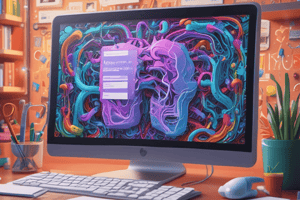Podcast
Questions and Answers
Что из перечисленного наиболее точно описывает кибернохондрию?
Что из перечисленного наиболее точно описывает кибернохондрию?
- Нежелание общаться с медицинскими работниками из-за страха перед болезнями
- Полное отсутствие интереса к вопросам, связанным со здоровьем
- Избыточный онлайн-поиск информации о здоровье, вызывающий беспокойство и тревогу (correct)
- Чрезмерное доверие к информации из интернет-источников по сравнению с мнением врачей
Как кибернохондрия может повлиять на отношения пациента с врачом?
Как кибернохондрия может повлиять на отношения пациента с врачом?
- Укрепляет доверие к врачам, поскольку пациенты лучше осведомлены
- Не оказывает никакого влияния на отношения пациента с врачом
- Может привести к конфликтам или подрыву доверия из-за разногласий в интерпретации информации (correct)
- Улучшает коммуникацию, поскольку пациенты более активно участвуют в обсуждении своего здоровья
Какой из следующих факторов НЕ является эффективной мерой по предотвращению кибернохондрии?
Какой из следующих факторов НЕ является эффективной мерой по предотвращению кибернохондрии?
- Полный отказ от использования интернет-ресурсов для получения информации о здоровье (correct)
- Понимание, что онлайн-информация не должна заменять профессиональную медицинскую консультацию
- Управление неопределенностью во время онлайн-поиска информации о здоровье
- Повышение грамотности в области онлайн-информации о здоровье
Как кибернохондрия может повлиять на профилактическое здравоохранение?
Как кибернохондрия может повлиять на профилактическое здравоохранение?
Какой из следующих подходов считается наиболее эффективным для лечения кибернохондрии?
Какой из следующих подходов считается наиболее эффективным для лечения кибернохондрии?
Flashcards are hidden until you start studying
Study Notes
Understanding Cyberchondria and Its Impact on Preventive Healthcare
Introduction
The advent of the internet revolutionized the way we accessed and consumed information, including health-related information. With the proliferation of online resources, individuals began to rely heavily on search engines like "Dr. Google" for health advice and information, leading to the emergence of a phenomenon known as cyberchondria. This condition involves excessive and repetitive online health searches, often resulting in increased distress or anxiety. As the digital age continues to evolve, so too must our understanding of cyberchondria and its potential implications for preventive healthcare.
Conceptualizing Cyberchondria
Cyberchondria has been defined as an excessive and/or repeated online health search associated with heightened distress or anxiety. The two primary theoretical models behind cyberchondria are reassurance seeking and specific metacognitive beliefs. Reassurance seeking refers to the tendency to search for information to alleviate health concerns and reduce anxiety, while the metacognitive belief model suggests that cyberchondria arises from thoughts and beliefs related to the search process itself, rather than the content of the information sought.
Correlates of Cyberchondria
Research indicates that cyberchondria is closely related to health anxiety, problematic Internet use, and symptoms of obsessive-compulsive disorder. Additionally, it has been observed to affect healthcare utilization and communication with healthcare providers. Individuals with cyberchondria may attempt to cope with their distress by avoiding contact with healthcare professionals, potentially leading to delayed treatment or misdiagnosis. Furthermore, cyberchondria may negatively impact the patient-physician relationship, causing conflict or undermining trust.
Prevention and Management of Cyberchondria
Preventing cyberchondria involves improving online health information literacy, addressing erroneous expectations of the Internet, and managing uncertainty effectively during online health searches. This includes understanding that online information should not replace professional medical advice, coping with information overload, and distinguishing between trustworthy and untrustworthy sources of online health information.
Management of cyberchondria requires an individualized approach to address the root causes and consequences of excessive online health searching. Healthcare providers must understand each person's unique circumstances, such as precipitating factors for online search, patterns of coping mechanisms, and the impact on various aspects of life. Relevant treatment targets may include facets of psychopathology related to health anxiety and obsessive-compulsive symptoms.
Cyberchondria and Preventive Healthcare
Cyberchondria can indirectly influence preventive healthcare through its relationship with fear of COVID-19 or other health concerns. Studies have shown that cyberchondria mediates the relationship between fear of COVID-19 and somatic burden, meaning that increased cyberchondria leads to more pronounced physical symptomatology. However, preventive measures for infectious diseases like vaccination against SARS-CoV-2 are less likely to be adhered to by individuals experiencing high levels of psychosomatic burden.
In conclusion, cyberchondria is a significant issue in today's digital age, affecting both personal and societal well-being. By better understanding the conceptualization, correlates, prevention, and management strategies for cyberchondria, we can work towards improving overall healthcare literacy and preventing unnecessary distress associated with online health research.
Studying That Suits You
Use AI to generate personalized quizzes and flashcards to suit your learning preferences.




